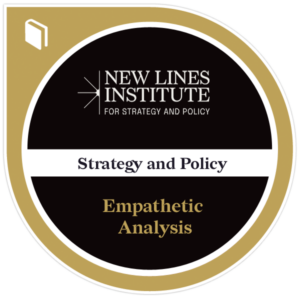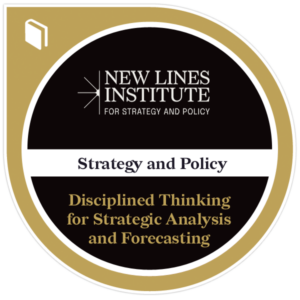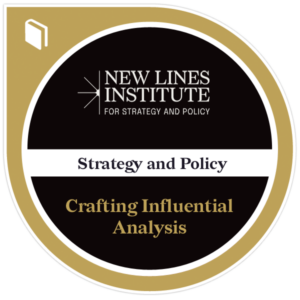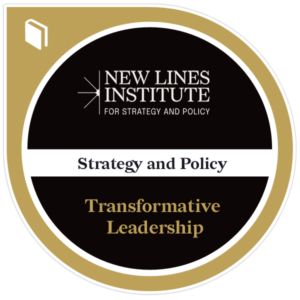Curriculum
Explore global affairs through an immersive DC program.
Course description
Our Master of Arts in Strategy and Policy Program offers a dynamic year-long experience, featuring a course each month. Immerse yourself in engaging readings, mandatory in-person sessions, and tailored writing assignments.
Explore global geopolitics, from counterterrorism to emerging technologies, guided by expert guest instructors in foreign policy, national security, diplomacy, and defense. At the program’s core is an exposure-maximizing residency requirement—a part-time internship propelling you through diverse scholars, focal areas, and think tank functions. You will collaborate directly with Institute staff on think tank projects — research, writing outreach and engagement.
Hosted at New Lines Institute’s offices in downtown Washington, D.C., our classes and internships require your in-person presence, paving an exciting path for your future in foreign policy work!
Download the academic calendar
Summer, Fall, and Spring semesters are 16 weeks in length. All three semesters are “required” terms for attendance purposes and students must maintain continuous attendance to remain enrolled. New cohorts only start in the Summer semester.
Course structure
The Master’s of Arts in Strategy and Policy Program will comprise twelve courses divided into three topical clusters.
Cluster 1: strategic analysis
Sharpen critical thinking, policy skills, and lifelong learning to solve global problems and shape US foreign policy.
Cluster 2: U.S. foreign and national security policy formulation
Analyze global power dynamics, evolving challenges, and historical lessons to craft effective policies.
Cluster 3: tradecraft and skills for foreign and national security policy professionals
Refine analytical skills, develop policy expertise, and build leadership for impactful careers in strategy and foreign policy.
1. Foundations of strategy and policy I: worldviews and models of thinking
This course introduces multiple concepts, tools, and processes of thinking that can serve in taking effective action and finding innovative solutions to challenges.
2. Strategic analysis for an interconnected world
This course will provide you with an understanding of strategic analysis in its various forms and components. It will address the intelligence process as well as different ways of analyzing data inputs, including geopolitical analysis, human agency analysis, and connectivity analysis. It will address how strategic analysis can be applied, including in the net assessment of a particular topic/country/theme, forecasting and scenario building, and informing policy recommendations.
3. Foundations of strategy and policy II: learning and being
The purpose of this initial course is to expand your capacities for learning by exploring the principles of learning and applying those daily and ultimately to the principles of policymaking.
4. Decision making in U.S. foreign and national security policy
This course will give you an in-depth understanding of how U.S. foreign and national security policies respond to domestic and foreign developments and how policy is developed, socialized, and implemented. You will learn core theoretical concepts such as deterrence, fait accompli, unilateralism, bilateralism, etc. You will finish the course able to develop relevant, actionable foreign policy recommendations.
1. Global citizenship and social impact
This course builds your capacity for and interest in thinking and acting like global citizens, creating impact in the world, and achieving purpose in that pursuit.
2. The global architecture
This course closely examines the structure of the international system and its features, including great powers, emerging players, trade, conflict, international organizations, and transnational non-state actors. You will learn how the current global architecture emerged in the wake of World War II and will examine its various stages of development. You will have the opportunity to explore these concepts through analytical assignments, debates, and war gaming exercises.
3. Connectivity and the global commons
This course will provide you with an in depth study of the concept of connectivity, which is fundamental to how the New Lines Institute approaches analysis and formulating policy recommendations. The course focuses on species-level themes such as climate change, food, and health, which provide challenges and opportunities for local, national, and international policymakers.
4. The Middle East as Challenge and Opportunity
This course explores the unique political and security dynamics of the Middle East, providing you with the tools to understand what makes this region distinctive and how it impacts US policy. You’ll examine fundamental questions about governance, citizenship, democracy, and conflict while learning to apply different schools of national security thinking to real-world challenges. The course culminates in crafting your own National Security Strategy for the Middle East, where you’ll balance American values and interests in this complex and strategically important region.
1. Analytical development
This course applies the analytical tradecraft you learned in Course 3 in the context of the knowledge acquired in Courses 4-8. The objective is to develop the skillset required to produce sophisticated assessments of issues that are at the intersection of global geopolitics and U.S. foreign policy.
2. Impact-driven project management
This course introduces you to the motivations and methodology that shape the New Lines Institute and its work. It focuses on the animating principles of the Institute and the institutional framework behind its projects, examining case studies of policy challenges the Institute works to address while helping you to use what they learn in their own work.
3. Capstone project presentation: operationalizing the connectivity framework
This course builds your capacities for career success in strategy and policy, providing concepts, tools, and processes to prepare students for a lifetime of career planning and transformative leadership across jobs and careers.
4. Designing your career and life
The purpose of this course is to explore possibilities and build your capacities for career success in the strategy and policy field, regardless of what you choose to do or the organizations you join. This course will provide concepts, tools, and processes to help you engage in career planning throughout your lifetime and prepare you for being a transformative leader regardless of your roles and career paths. The focus is on generating career options, determining priorities, setting goals, developing plans, and taking action – always keeping in mind that we live in a dynamic, complex, and evolving world.
Program description
Just as medical students undergo intensive, practical training as part of their professional education, fellows at New Lines Institute will too. Over the course of 12 months in our Master of Arts in Strategy and Policy Program, fellows will benefit from a unique blend of academic exploration and training in the practical skills necessary to launch a career in foreign policy.
Throughout the program, fellows will work alongside policy scholars, develop analytical tradecraft, and confront real-world challenges while connecting with different elements of Washington D.C. Fellows will gain exposure to the inner workings of a foreign policy think tank, complementing their classroom learning and refining their practical skills. Our fellows, through an integration of theory and practice, will become both knowledgeable scholars and skilled practitioners, fully equipped to navigate the complexities of foreign policy.
Program structure
Learn practical skills and tackle real-world challenges.
Policy exploration
Hands-on learning
In addition to academic exploration, you will immerse yourself in the practical mechanics of think tank operations. From mastering events management to crafting effective outreach strategies and refining analytical writing skills, you will acquire valuable applied experience essential for success in a foreign policy career.
Micro-Credentials
Micro-credentials (MCs) are competency and skills-based certifications that allow earners to showcase learning outcomes mastered during their educational or professional journey. Affordable, flexible, and brief; micro-credentials provide earners with the opportunity to acquire – or further develop – competencies and skills that align with their educational needs and industry demands. Micro-credentials verify and validate that the critical competencies and skills acquired have been achieved.
For students enrolled in the New Lines Institute MA in Strategy and Policy, our micro-credential offerings are embedded within our curriculum and have no extra cost for our students.
New Lines Institute has partnered with global digital badging platform, Credly, to provide earners with the ability to share their competency or skills-based micro-credential in the form of a digital badge.

Empathetic Analysis
Earners of this badge have developed the essential abilities needed to conduct empathetic analysis in a range of settings. Empathetic analysis is a skill that will foster the understanding of various viewpoints to navigate the complexities of the international system, both in the public and private sectors. Key features of empathetic analysis include the awareness of cognitive bias, both in oneself and in others, as well as self-observation and self-reflection. Empathetic analysis not only enables better decision making in all aspects of work and life, but also can also provide the ability to anticipate and prepare for future challenges and opportunities across local and global settings.

Disciplined Thinking for Strategic Analysis and Forecasting
Earners of this badge will have developed the ability to maintain intellectual discipline while doing strategic analysis and forecasting. Disciplined thinking is a skill allowing one to set aside subjective preferences while processing an inordinate amount of intelligence to be able to evaluate what is happening in a given situation and what will likely happen next. At the New Lines Institute, this is both a practice and a value especially in the social media age in which the global public discourse is increasingly marred by partisanship, ideological affiliations, and identity politics. Those who earn this badge will also know how to disentangle empirical arguments from normative ones while not treating the interests and ideals of actors in a binary fashion.

Crafting Influential Analysis
Earners of this badge will be able to produce assessments that policymakers and decisionmakers will privilege over the broader epistemic intellectual output. Analysis is influential if it either supplies a demand of policy stakeholders or informs them of gaps in their thinking. Crafting influential analysis involves understanding the art of the doable from the perspective of those in government and the private sector. Those who attain this badge will have developed the skills to understand the needs of the policy audience and be able to craft actionable content.

Transformative Leadership
Earners of this badge have developed essential skills required for them to be effective leaders in professional work settings and as an active member of civil society. The New Lines Institute encourages the development of leaders able to inspire teams with members from diverse backgrounds and perspectives possessing diverse skillsets. These New Lines Institute-trained leaders are effective multicultural managers taught to develop action plans to achieve the goals of their groups who are required to show an honest and thorough attempt to use the diverse skills and perspectives of the group members. Earners of this badge are taught to be transparent and empathetic, but also decisive when action is required, learning how to be credible final decision makers for the groups they lead. Toward this goal, they are trained how to demonstrate a clear ability to set imaginative, but also achievable, goals for their groups. The earners of this badge are provided frequent opportunities to practice these core leadership skills in small group settings but are also taught how to apply the same skills to larger groups.

